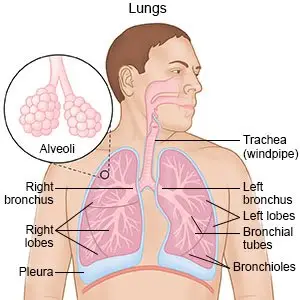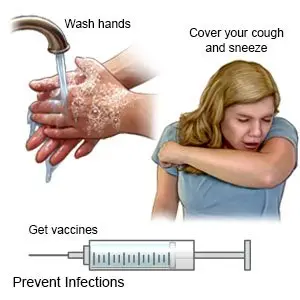What is aspiration pneumonia?
Aspiration pneumonia is a lung infection that develops after you aspirate (inhale) food, liquid, or vomit into your lungs. You can also aspirate food or liquid from your stomach that backs up into your esophagus. If you are not able to cough up the aspirated material, bacteria can grow in your lungs and cause an infection.
 |
What increases my risk for aspiration pneumonia?
Your risk is highest if you are older than 75 or live in a nursing home or long-term care center. You may become less active as you age, or you may be bedridden. You may not be able to swallow or cough well. The following also increase your risk for aspiration pneumonia:
- Weakened muscles that help you swallow caused by Alzheimer disease or other diseases
- A weakened immune system caused by diabetes, COPD, heart failure, or other health problems
- Smoking cigarettes
- Use of a feeding tube or ventilator that allows bacteria to travel to your lungs
- Surgery or radiation to treat cancer of the head or neck
- Oral hygiene problems, teeth that are missing, or dentures
- Alcoholism or IV drug use
What are the signs and symptoms of aspiration pneumonia?
- Fever
- Cough, which may or may not bring up mucus
- Sputum (spit) that is pink or frothy
- Bluish skin around your mouth or your fingertips
- Trouble swallowing
- Shortness of breath, rapid breathing, or noisy breathing
- Chest pain or a rapid heartbeat
- Confusion or changes in alertness
- Voice changes such as gurgling and hoarseness
- Loss of appetite or weight loss
How is aspiration pneumonia diagnosed?
It is common to aspirate but not know it. Your healthcare provider may diagnose aspiration pneumonia if you have symptoms and a history of swallowing problems. He or she will ask about your symptoms and when they started. He or she will look inside your mouth and down your throat, and listen to your heart and lungs. Your provider will ask you to speak and cough while he or she listens. Tell him or her about any health problems you have and any medicines you use. You may need any of the following tests:
- Blood tests are used to find out if your white blood cell count is high. This can be a sign of infection.
- A barium swallow may show if you have long-term swallowing problems. Your healthcare provider will watch you swallow different foods and liquids. You may be asked to drink a thick liquid called barium while healthcare providers take x-rays of your throat, esophagus, and lungs.
- A sputum culture may be tested for bacteria that can cause pneumonia. Your healthcare provider may ask you to cough mucus into a cup, or he or she may suction mucus from your throat.
- X-ray or CT pictures may show lung damage or an infection, such as swelling and fluid in your lungs. You may be given contrast liquid before the CT scan so your healthcare provider can see the pictures better. Tell your healthcare provider if you have ever had an allergic reaction to contrast liquid.
How is aspiration pneumonia treated?
You may need any of the following:
- Antibiotics are given to treat pneumonia caused by bacteria. You may be given antibiotics as pills or through your IV.
- Steroids are given to reduce swelling in your lungs.
- You may need extra oxygen if your blood oxygen level is lower than it should be. You may get oxygen through a mask placed over your nose and mouth or through small tubes placed in your nostrils. Ask your healthcare provider before you take off the mask or oxygen tubing.
Treatment options
The following list of medications are in some way related to or used in the treatment of this condition.
- prednisone
- Augmentin
- Flagyl
- Zosyn
- Prevacid
View more treatment options
What can I do to manage aspiration pneumonia?
- Do not smoke. Nicotine and other chemicals in cigarettes and cigars can cause lung damage. Ask your healthcare provider for information if you currently smoke and need help to quit. E-cigarettes or smokeless tobacco still contain nicotine. Talk to your healthcare provider before you use these products.
- Go to speech therapy as directed. A speech therapist can teach you exercises to strengthen the muscles you use to swallow.
What can I do to prevent aspiration pneumonia?
- Ask about vaccines you may need. A pneumonia vaccine can help lower your risk for pneumonia. The vaccine may be recommended every 5 years, starting at age 65. Vaccines help lower the risk for infections that can become serious for a person who has pneumonia. Get a flu vaccine each year as soon as recommended, usually in September or October. Get a COVID-19 vaccine and booster as directed. Your healthcare provider can tell you if you should also get other vaccines, and when to get them.
- Prevent the spread of germs. Wash your hands often with soap and water. Use hand sanitizer when soap and water are not available. Do not touch your eyes, nose, or mouth unless you have washed your hands first. Cover your mouth when you cough. Cough into a tissue or your shirtsleeve so you do not spread germs from your hands. If you are sick, stay away from others as much as possible.

- Sit up while you eat. If you are bedridden, keep the head of your bed slightly up (at about a 30° to 45° angle) while you eat. Take small bites, eat slowly, and swallow with your chin down.
- Eat soft foods and drink thickened liquids. A dietitian can teach you how to thicken your liquids so you have less trouble swallowing. Drink liquids through a straw or sip them from a spoon. Ask your dietitian what kinds of foods you should eat. He or she may suggest soft foods such as cooked cereal, pasta, well-cooked fruits and vegetables, and scrambled eggs. Your dietitian may also suggest moist, tender meats that are cut into small pieces.
- Care for your teeth and mouth. Mouth care can help kill harmful bacteria in your mouth so you do not aspirate them. While you are sitting up, brush your teeth for 2 minutes daily after breakfast and again after dinner. Also brush your tongue. If you do not have teeth, gently brush your gums with a soft toothbrush. Dentures should be removed and cleaned with an electric toothbrush and water after breakfast and dinner. Soak dentures overnight in a cleaning solution. Visit a dentist regularly to have your teeth and gums cleaned.
- Limit or do not take sedatives. These medicines increase your risk for aspiration because they dry out your mouth and make you drowsy. If possible, avoid taking antihistamine medicines. They also make your mouth dry.
When should I seek immediate care?
- You have chest pain.
- You are confused or cannot think clearly.
- You have more trouble breathing, or your breathing seems faster than normal.
When should I call my doctor?
- You have a fever.
- Your symptoms are not better after 2 or 3 days of treatment.
- You have questions or concerns about your condition or care.
Care Agreement
You have the right to help plan your care. Learn about your health condition and how it may be treated. Discuss treatment options with your healthcare providers to decide what care you want to receive. You always have the right to refuse treatment. The above information is an educational aid only. It is not intended as medical advice for individual conditions or treatments. Talk to your doctor, nurse or pharmacist before following any medical regimen to see if it is safe and effective for you.© Copyright Merative 2023 Information is for End User's use only and may not be sold, redistributed or otherwise used for commercial purposes.




